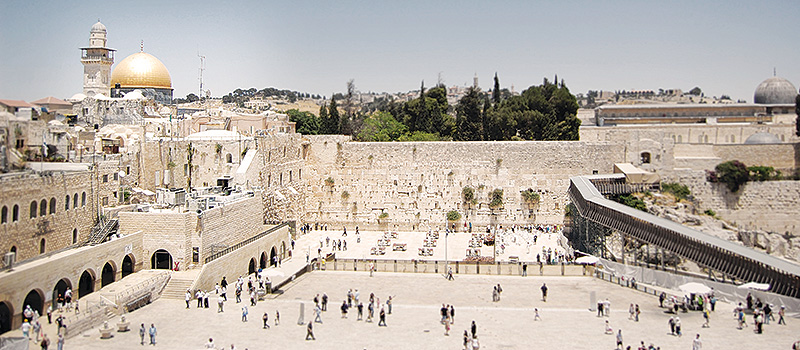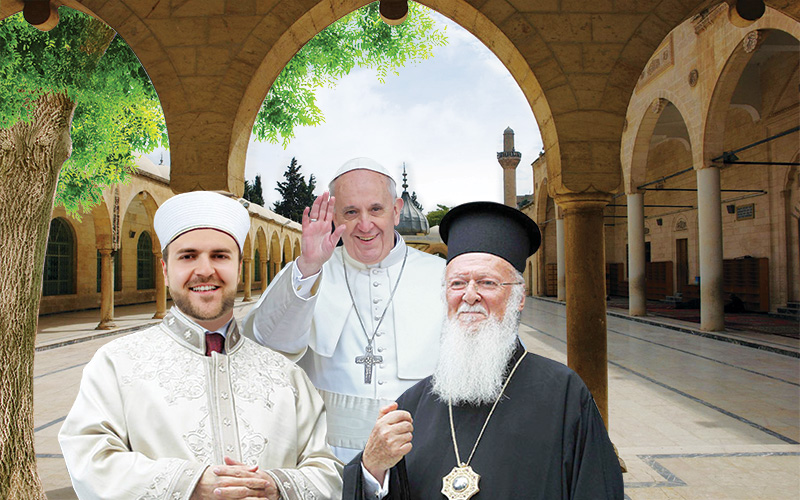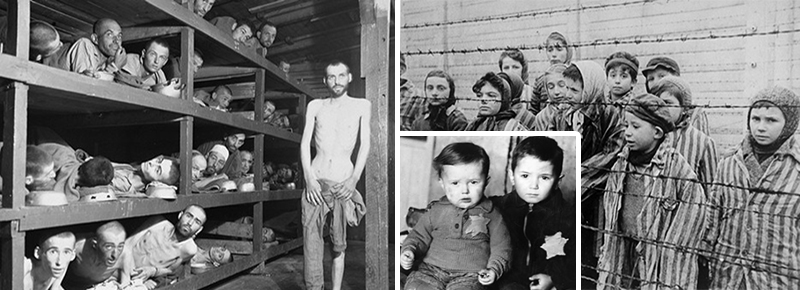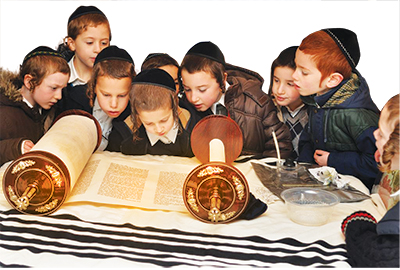God calls to the Abode of Peace and He guides whom He wills to a straight path.
(Qur'an, 10:25)
 |
Another important topic that has been on the agenda with the acts of terrorism against the United States is the relation between the Western and Islamic world. As is known, by the 90s, some intellectuals were falsely suggesting that a struggle would take place between the West and Islamic world in the near future. This is the basic theme of Samuel Huntington's well-known thesis "The Clash of Civilisations". However, this thesis – better called as "The Clash of Ignorance" by Edward W. Said – rests on an imaginary scenario generated by the exaggeration of the influence of some radical and ignorant factions to be found in these two civilisations. Huntington's idea of "clashes of civilisations" is a theory without any scientific, intellectual or conscientious basis. Various civilisations have always existed in different parts of the world throughout the history and these civilisations interacted with each other socially and culturally, and took part in an "exchange of civilisations." Every race, every nation, every community has a different civilisation and every civilisation has their unique qualities and people get something from all civilisations in line with the principles of mutual understanding and reconciliation.
This idea of conflict was tested in recent history through communism, which culminated in the bloody losses of the 20th century. However, what the world needs at the moment is not war, but total peace.
Moreover, policies which favour conflict can never benefit anyone and besides there can be no clash between Western civilisation and Islamic civilisation, because the beliefs of Judaism and Christianity, the tenets upon which Western civilisation is based, are in perfect harmony with Islam.
In the Qur'an, Jews and Christians are called the "People of the Book". This is because the members of these two religions abide by the Divine Books revealed by God. The outlook of Islam on the People of the Book is extremely just and compassionate.
This attitude towards the People of the Book developed during the years of the birth of Islam according to the principles in the Qur'an. At that time, Muslims were a minority, struggling to protect their faith and suffering oppression and torture from the pagans of the city of Mecca. Due to this persecution, some Muslims decided to flee Mecca and shelter in a safe country with a just ruler. The Prophet Muhammad (pbuh) told them to take refuge the Christian king of Ethiopia. The Muslims who went to Ethiopia found a very fair administration that embraced them with love and respect. The King refused the demands of the pagan messengers who had travelled to Ethiopia and asked him to surrender the Muslims to them, and announced that Muslims could live freely in his country.
These Christian attitudes of compassion, mercy, and justice, are referred to in a verse of the Qur'an which states:
... You will find the people most affectionate to those who believe are those who say, "We are Christians." That is because some of them are priests and monks and because they are not arrogant. (Qur'an, 5:82)
 |
When Muslims, Christians and Jews unite around a common word, when they understand that they are friends, not enemies, the world will be a very different, beautiful place. |
Christian and Muslim beliefs have many aspects in common. Judaism too shares many beliefs with Islam. In the Qur'an, God relates that Muslims share the same faith with the People of the Book and that they say to them "We have faith in what has been sent down to us and what was sent down to you. Our God and your God are one and we submit to Him." (Qur'an, 29:46)
All true adherents of these three great religions:
◉ Believe that God has created the entire universe out of nothing and that He dominates all that exists with His omnipotence.
◉ Believe that God has created man and living things in a miraculous way and that man possesses a soul granted him by God.
◉ Believe in resurrection, heaven and hell and angels, and that God has created our lives with a certain destiny.
◉ Believe that God sent many prophets such as the Prophet Noah (pbuh), the Prophet Abraham (pbuh), the Prophet Isaac (pbuh), the Prophet Joseph (pbuh) and the Prophet Moses (pbuh) throughout history, and they love all these prophets.
In one verse, that Muslims make no distinction among prophets is related as follows:
The Messenger believes in what has been sent down to him by his Lord, and so do the believers. Each one believes in God and His angels and His Books and His Messengers. We do not differentiate between any of His Messengers. They say, "We hear and we obey. Forgive us, our Lord! You are our journey's end." (Qur'an, 2:285)
The beliefs of the People of the Book are in harmony with Muslims, not only in terms of faith-related issues, but also of moral values. Today, in a world where such immoralities as adultery, drug addiction and a model of egoism and self-seeking cruelty have grown widespread, the People of the Book and Muslims share the same virtues: Honour, chastity, humility, self-sacrifice, honesty, compassion, mercy and unconditional love.
Even though such concepts like "The End of History" and the "Clash of Civilisations" started to be popular from the 90's onwards, one fact looms in these harsh times; these concepts have no validity whatsoever and they fail to deliver any solutions. Experience has taught us that we cannot build bliss upon the misery of others. This being the case, we need to find the way of binding up these wounds together and "recovering" as soon as possible. One means to this is to understand the value that the Qur'an attaches to the People of the Book.
 |
Today both the Muslims and the People of the Book are engaged in a broadening struggle against immoralities such as sexual perversions or drug addiction. Each of these three religions accepts chastity, honesty and self-sacrifice as the greatest virtues. |
Today all good things have been made halal [lawful] for you. And the food of those given the Book [Jews and Christians] is also halal for you and your food is halal for them. So are chaste women from among the believers and chaste women of those given the Book before you [Jews and Christians], once you have given them their dowries in marriage, not in fornication or taking them as lovers. But as for anyone who rejects faith, his actions will come to nothing and in the hereafter he will be among the losers. (Qur'an, 5:5)
This verse describes the value that Muslims place on the People of the Book with various pieces of important detail. According to this verse, a Muslim man is allowed to marry a woman of the People of the Book. This is a significant permission, because as commanded in the verse, "Corrupt women are for corrupt men and corrupt men are for corrupt women, good women are for good men and good men are for good women…" (Qur'an, 24:26), Muslims have a responsibility to marry good, clean people. This indicates that Jews and Christians are also good, clean people.
In addition, there is a very important criterion in this verse. A Muslim will intend to take a Jewish or Christian woman as his wife, to call her "darling" or "beloved," to start a family with her, to spend his life with her and even to spend eternal life with her. This is the sole person throughout his life with whom he will share all his troubles and all his happiness. These two look after one another when they are ill, and trust one another.
According to the fanatics' way of thinking, however, a person should feel enmity toward the woman he calls "beloved," with whom he spends his life and entrusts his own life to, the mother of his children, and declare her to be cursed only because she is a Christian or a Jew. One would have to be profoundly psychologically disturbed to do that. This verse describes the love to be shown to a Jew or Christian by a rational Muslim who heeds the Qur'an.
The verse also bestows a special authorization on Muslims: the authority to eat food prepared by the People of the Book. This is very important. As we know, Muslims have to pay great attention to certain prohibitions when preparing food; pork, and meat from an animal that has not been slaughtered in the name of God, is prohibited in Islam. The fact that food prepared by Jews and Christians is made lawful shows that these people are to be trusted. The same thing also applies to Christians and Jews, and the verse makes food prepared by Muslims lawful for them.
It will also be useful to refer to another expression of friendship here. The People of the Book and Muslims can eat together under the same roof, be one another's guests, sit down at the same table and play host to one another. This is a description of friendship. What is being described is not an environment based on hatred and killing, but one of love, friendship and brotherhood.
This is not the only verse to set out the position of the People of the Book. God praises the People of the Book in many of the Qur'an's verses. The related verses include:
Among the people of Moses there is a group who guide by the truth and act justly in accordance with it. (Qur'an, 7:159)
They are not all the same. There is a community among the People of the Book who are upright. They recite God's signs throughout the night, and they prostrate. They have faith in God and the Last Day, and enjoin the right and forbid the wrong, and compete in doing good. They are among the righteous ones. They will not be denied the reward for any good thing they do. God knows those who have fear of God. (Qur'an, 3:113-115)
Among the people of the Book there are some who have faith in God and in what has been sent down to you and what was sent down to them, and who are humble before God. They do not sell God's signs for a paltry price. Such people will have their reward with their Lord. And God is swift at reckoning. (Qur'an, 3:199)
Among the people of the Book there are some who have faith in God and in what has been sent down to you and what was sent down to them, and who are humble before God. They do not sell God's signs for a paltry price. Such people will have their reward with their Lord. And God is swift at reckoning. (Qur'an, 3:199)
As these verses clearly show, pure and sincere Jews and Christians are praised with fine words in the Qur'an and are promised a fine reward by God; God says that He will take these people into paradise. This is an expression of His love. How can a Muslim be the enemy of someone whom God loves, is pleased with and welcomes into paradise? That is impossible according to the Qur'an. Such enmity is a crime according to the Qur'an. Therefore, the fanatics who adopt false hadiths as their guide – despite the verses of the Qur'an clearly demonstrating the contrary – are committing an offense in the view of Islam by spreading hostility toward the People of the Book.
What needs to be done is to invite the People of the Book to Islam using pleasant words, and then to leave the decision up to them.
 |
In the Qur'an, Christians and Jews are defined as the People of the Book, and there is a command to show respect, mercy and kindness to them. Both Christians and Jews believe in God and share the same moral values as Muslims. |
Only argue with the People of the Book in the kindest way – except in the case of those of them who do wrong – saying, "We have faith in what has been sent down to us and what was sent down to you. Our God and your God are One and we submit to Him." (Qur'an, 29:46)
Say, "People of the Book! Come to a proposition which is the same for us and you – that we should worship none but God and not associate any partners with Him and not take one another as lords besides God." If they turn away, say, "Bear witness that we are Muslims." (Qur'an, 3:64)
These verses show that the duty of Muslims is not to disparage the People of the Book, force them into a corner, feel hatred for or kill them, as some fabricated hadiths suggest. It is simply to summon them to the oneness of God in the most pleasant manner. Monotheism is the fundamental doctrine in all three faiths. Muslims can meet with and speak to the People of the Book, preach to them and call on them to believe in the oneness of God and all the sacred scriptures that have been sent down. Communication, preaching and friendship exist among them. According to the Qur'an, a Muslim has a responsibility to speak kindly to a Jew or a Christian when he sees one and to invite him to believe in the oneness of God using very kind words, rather than jostling him into a corner.
Since some Muslim communities are unaware of the verses of the Qur'an and are exceedingly ignorant on the subject of Islam, they strive to remove the Jews from the Holy Land or to wipe the state of Israel off the map. They are unaware that in doing this they are rebelling against the Qur'an.
According to the Qur'an, the Jews have the right to live in the Holy Land. Verses on the subject read:
Remember when Moses said to his people, "My people! Remember God's blessing to you when He appointed prophets among you and appointed kings for you, and gave you what He had not given to anyone else in all the worlds! My people! Enter the Holy Land which God has ordained for you. Do not turn back in your tracks and so become transformed into losers." (Qur'an, 5:20-21)
We said to the tribe of Israel after that, "Inhabit the land and, when the promise of the hereafter comes, We will produce you as a motley crowd." (Qur'an, 17:104)
As clearly shown in the verses of the Qur'an, both the Torah and the Qur'an state that Jews must exist in the Holy Land. Indeed it is a good thing for there to be Jews in the Holy Land, and that is a source of joy for true Muslims. It is an exceedingly fine thing to see a promise made by God 3,000 years ago coming true and witnessing what was foretold by the Prophet Abraham (pbuh) and the Prophet Moses (pbuh). God revealed that, "The Jews will be in those lands" thousands of years ago, and we can see that miracle manifested now. This is a wonderful state of affairs to be observed with fervour and joy.
It is of great importance to state that God imposes one essential condition on sincere believers, both in the Qur'an and the Torah – "Peace." There will be Jews in the Holy Land; there will also be Muslims and Christians there, and they will altogether ensure that love and peace prevail across the region. They will live in brotherhood. There is plenty of room for all. Nobody will be forced from his home or driven away. That will not happen. This is a religious service for Jews, Christians and Muslims all. God always wants peace for all of us.
 |
Muslims want Jews, Christians and themselves to live in peace and contentment, treating each other with understanding, friendship, respect and compassion. |
Another important fact we learn from the Qur'an is that Muslims must respect Jewish and Christian places of worship. In the Qur'an, the places of worship of the People of the Book, ie. monasteries, churches and synagogues, are mentioned as places of worship protected by God.
... if God had not driven some people back by means of others, monasteries, churches, synagogues and mosques, where God's name is mentioned much, would have been pulled down and destroyed. God will certainly help those who help Him – God is All-Strong, Almighty. (Qur'an, 22:40)
This verse shows every Muslim the importance of respecting and protecting the holy places of the People of the Book.
Indeed, the Prophet Muhammad (pbuh) also made contracts with pagans as well as the People of the Book. Pagans were always treated with justice, and when they asked to be taken under protection, their requests were readily accepted by the Prophet (pbuh). This meant that these communities sought the protection of the Messenger of God (pbuh) in the face of an attack or a wrongful accusation. Throughout his life, many non-Muslims and pagans requested protection from the Prophet Muhammad (pbuh), and he took them under his protection and ensured their security. In the Qur'an God advises that requests of pagans seeking protection be accepted by believers. Of this, God says the following:
If any of the idolaters ask you for protection, give them protection until they have heard the words of God. Then convey them to a place where they are safe... (Qur'an, 9:6)
Jews and Christians, due to their shared commonalities with Muslims are much closer to Muslims than those who have no faith in God. Each of these religions has its book, that is, they are subject to a book sent down by God. They know what is right and what is wrong, what is lawful and what is unlawful according to their scriptures, and all revere the prophets and messengers that accompanied them. They all believe in a hereafter, and afterlife where they will have to give an account to God for all their actions. So, there is a shared foundation from where we all can unite upon.
 |
Mosques, churches and synagogues are special places of prayer where the name of God is revered. In the Qur'an, God says that all these sanctuaries must be respected and preserved. |
Concerning the People of the Book, God gives Muslims a command in the Qur'an; to rally to a common formula:
Say, "O People of the Book! Let us rally to a common formula to be binding on both us and you: That we worship none but God; that we associate no partners with Him; that we erect not, from among ourselves, Lords and patrons other than God." (Qur'an, 3:64)
This is indeed our call to Christians and Jews: As people who believe in God and follow His revelations, let us rally to a common formula – "faith". Let us love God, Who is our Creator and Lord, and follow His commands. And let us pray to God to lead us to an even straighter path.
When Muslims, Christians and Jews rally to a common formula this way; when they understand that they are friends not enemies, then the world will become a very different place. The wars in many parts of the world, enmities, fears and terrorist attacks will come to an end, and a new civilisation based on love, respect and peace will be established upon this "common formula" once an intellectual struggle is waged against radical ideas and ideologies that lead to denial of God.
There are important facts to consider for Muslims. What God teaches us in the Qur'an about different peoples and creeds is clear: The morality of the Qur'an excludes every kind of racism.
It is evident that some of the Jews who lived in the past have committed many errors which are stated and criticized in the Qur'an. But all this must not be taken by Muslims as a cause to feel hostility against all Jews. The crime committed by some Jews cannot be ascribed to Judaism and the Jewish nation.
 |
The evils in the world will come to an end when Muslims, Christians and Jews all worship God in unity, respecting their differences. |
Again a basic vantage point prescribed in the Qur'an is not to make judgements about people just because they belong to a particular race, nation or religion. In every community, there are good people as well as wicked people. This differentiation is stated in the Qur'an. For instance, right after mentioning the rebellious nature – against God and His religion – of some people among Jews and Christians, there is reference to an exception and, said thus:
[However] They are not all alike. Among the People of the Book there is an upright community who recite the revelation of God during the night and fall prostrate before Him. They believe in God and the Last Day, enjoin what is right and forbid what is evil, and vie with one another in good works. They are of the righteous and whatever good they do, its reward will not be denied them. God knows those who fear [Him]. (Qur'an, 3:113-115)
God revealed to all messengers that He is the Unique and that there is no one but Him Whom people must worship, serve and obey. The Divine message, conveyed to the people by God through His messengers, has been communicated to people since the Creation of man. Some societies have accepted the message and followed the right path while others have denied and swerved from it. This also holds true for the present day. Some people will side with the righteous, whereas some others will plunge into mischief. This is the law of God. Those who believe should also adopt such an outlook and never forget that there may be sincere, pious people who have fear of God among the members of all religions as well as those who are far removed from the religious tenets.
Our hope is that a world will be established in which people will be able to live together in peace, no matter what race or religion they belong to, in which every racist perversion will be rejected, everyone's rights will be safeguarded and everyone will be respected. The struggle that will have to take place on intellectual grounds against radicalism and anti-religious ideologies will hopefully establish the peace that has been longed for. Of this God relates the following in the Qur'an:
Those who disbelieve are the friends and protectors of one another. If you do not act in this way (be friends and protectors of one another) there will be turmoil in the land and great corruption. (Qur'an, 8:73)
Would that there had been more people with a vestige of good among the generations of those who came before you, who forbade corruption in the earth, other than the few among them whom We saved. … (Qur'an, 11:116)
 |
 |
 |
Another important fact that draws Christianity, Judaism and Islam together and necessitates them to act together is the atheist philosophies that are so influential in our time. There is also the damage caused by various radical notions that were later made a part of the three Divine religions.
Among the best-known and most harmful philosophies of our age can be cited materialism, communism, fascism, anarchism, racism, nihilism and existentialism. Many people who believed in the false diagnoses, deceptive descriptions and explanations of these ideas on the universe, society and man, have lost their faith or doubted it. What is more, these ideologies have dragged people, societies and nations into great crises, conflicts and wars. Their share of the blame for the pain and troubles that humanity suffers from today is immense.
While they deny God and Creation, all the above-mentioned ideologies are based on a so-called scientific basis; Charles Darwin's theory of evolution. Darwinism constitutes the basis of atheist philosophies. This theory briefly claims – without having any scientific basis – that living beings have evolved as a result of coincidences and by means of a struggle for life. Therefore, Darwinism sends this deceptive message to people:
"You are not responsible to anyone, you owe your life to coincidences, you need to struggle, and if necessary to oppress others to succeed. This world is one of conflict and self-interest".
The social messages put across by Darwinist concepts such as "Natural selection", "struggle for life", "survival of the fittest" are a means of dangerous indoctrination. This evil morality advises people to be egoistical, self-seeking, cruel and oppressive. It destroys such virtues as mercy, compassion, self-sacrifice and humility, the moral values of the three great monotheistic religions and presents this as if it is a necessity of "the rules of life."
This Darwinist indoctrination is just the opposite of the beliefs of the People of the Book and the morality of the Qur'an. Consequently, the Darwinist indoctrination constitutes the foundation of a world which inherently opposes all the three Divine religions.
This being the case, it is necessary for the People of the Book and Muslims to co-operate, since they believe in God and accept the morality that He teaches. The followers of these three religions should expose to the world the fallacy of Darwinism, which has no scientific basis, but which people are trying to preserve for the sake of materialist philosophy. They should co-operatively carry out an intellectual struggle against all other deceptive ideas (communism, fascism, racism) that serve atheism. They need to make an effort to explain that the radical ideas that were later made a part of every religion are wrong and tell the truth instead. Once these are realized, the world will, in a very short time, embrace peace, tranquillity and justice.
 |
Our world has seen its fair share of brutality.
From Hulagu Khan, who boasted about killing 200,000 Muslims during his violent week-long rampage in the city of Baghdad, which also resulted in the complete destruction of centuries-old heritage, to Vikings that took what they deemed desirable by force, to the modern-day Syrian regime targeting its own people, we can say that our world has witnessed some unspeakable acts of violence and still does in such places as East Turkestan, Kashmir and Iraq among many others.
However, throughout history, some groups were targeted more than others. Like the Jewish people: Their ordeal started at the hands of Pharaoh, who killed their boys and let only their girls live. The oppression against Jews continued throughout antiquity, at the hands of the Assyrians, Babylon and the Romans, who massacred and exiled Jews and destroyed their temples and cities. In medieval times, Jews were once again targeted, labelled, discriminated against and chased away from wherever they took shelter. The oppression continued in recent history when six million Jews were slaughtered by Nazis.
Today, that persecution still goes on in some parts of the world.
Anti-Semitism in Europe lingers in the form of harassment in public areas, offensive remarks and discriminatory behaviour in social life and more terrifyingly, in the form of brutal assaults; the vandalizing and looting of Jewish businesses, burning of cars, hundreds chanting "gas the Jews," "kill the Jews," in violent protests, shootings and fire-bomb attacks against synagogues, and the recent Creteil attack in France in which a Jewish couple was brutally attacked in their home. That incident was a horrible reminder of the 2006 incident – again in France – that involved a young Jewish man being captured, tortured for weeks and then left naked to die.
France is not the only place that witnesses anti-Semitism. From Argentina to Tunisia, from Ireland to Spain, Jews seem to be caught up in a constant cycle of hatred targeting their communities. Even in the US, which is certainly well-known for its unwavering support for Israel, Jewish people are wary of divulging their identities, or practicing their religious duties in public. An unprovoked attack on a 24-year-old Jewish man wearing a kippa by four men in Brooklyn, New York; the assault of a 12-year-old Jewish girl, who had a bottle thrown at her by a group of girls, including one who yelled, "You dirty Jew"; and the attack on a Jewish man in Los Angeles, California, who was surrounded by five male suspects who yelled "Heil Hitler!" before striking him, can be listed among the disturbing recent incidents in the US.
The Middle East is home to the worst cases of anti-Semitism, however. Especially after the recent Gaza war, hatred toward Jewish people regardless of age, gender or involvement in the conflict has risen in a disturbingly fast manner.
But why do some people seem to think that it is legitimate to hate Jews?
In the past, some people saw Jews as underhanded conspirators who segregated themselves from the societies they lived in due to widespread anti-Semitic propaganda, such as The Protocols of the Elders of Zion. The sentiment was further fuelled with notorious lies like the blood libel, portraying Jews as the veritable embodiment of evil. Today, the conflict between Israelis and Palestinians is the driving force behind this ubiquitous hatred, and often used as a cloak to justify violence against ordinary Jews on the streets.
Surely political administrations or individuals within a community might make mistakes. However, persecuting an entire community based on the acts of a few would be neither Qur'anic nor moral. The Jewish people are known for their calm and modest demeanour. They are a quiet people that like to occupy themselves with their daily routine and religious practices. Therefore it is even more shocking that such a calm and reserved people have been on the receiving end of such persecution throughout the history.
Any disagreement with the policies of the Israeli government should be voiced in a civil manner, without putting the blame on the entire community. God prohibits Muslims from such a behaviour. In the Qur'an, God warns believers as such:
"O you who have believed, be persistently standing firm for God, witnesses in justice, and do not let the hatred of a people prevent you from being just. Be just; that is nearer to righteousness. And fear God; indeed, God is Acquainted with what you do." (Qur'an, 5:8)
It is most natural for there to be good and bad people in every group, community or nation. Just like there are countless murderers, liars and criminals in Muslim communities, it is natural for Jewish communities to include people whose actions are less than commendable. Yet, it is patently absurd and utterly ridiculous to feel antipathy toward a group in its entirety for the actions of a few. Most importantly, it is opposite to the teachings of the Qur'an.
According to the Qur'an, Jews are People of the Book and are to be respected, protected and approached with love. God praises Jews in many verses for their devotion and piety and indeed, the Jewish people serve as a great example to Muslims with their unwavering loyalty to the Prophet Moses.
All these facts make it abundantly clear that there is no basis, either in Islam or in Judaism, that could lead to such hostility. Once everyone realizes that God created this world for love and it is against God's wishes toharbour hostile feelings toward each other, brotherhood and peace will prevail.
 |
The persecution of Jews throughout history was basically a consequence of racist prejudices, which are definitely contrary to Islam. No Muslim should condone unjust or cruel treatment of innocent Jewish people and children. |
◉ There are accounts of our Prophet (pbuh) attending wedding feasts of the People of the Book, visiting them when they were sick and giving them presents.
◉ When the Christians of Najran visited him, the Prophet Muhammad (pbuh) spread out his robe on the ground for them to sit on and welcomed them in that fashion.
◉ One of the wives of our Prophet (pbuh) was Marya bint Sham'ûn (also known as Maryam al-Qubtiyyah), a Coptic Christian from Egypt.
◉ Our mother Safiyya bint Huyayy, one of the wives of the Prophet (pbuh), was the daughter of the chief of the Jewish tribe Banu Nadir of Medina, Huyayy ibn Akhtab.
◉ The Prophet Muhammad (pbuh) allowed the Jews to become a party to the Constitution of Medina signed with the clans of the Aws and Khazraj, thus ensuring the survival of the Jews as a separate religious group among the Muslims.
◉ Under the article, "The Jews of Banu Awf are a community along with the believers. To the Jews their religion, and to the Muslim their religion," of the Constitution of Medina, the foundation of the respect that Muslims have for the Jews' traditions and beliefs was laid in the time of our Prophet (pbuh). Articles 26-33 of the same constitution state that members of the People of the Book enjoy the same rights as Muslims, while article 16 states that no injustice is to be inflicted on them.
◉ In the year 630 A.D., our Prophet (pbuh) issued the following command to envoys of the King of Himyar who came to Medina to announce that they had become Muslims: "If a Jew or Christian becomes a Muslim, he becomes equal to believers [enjoys the same legal rights with Muslims]. Whoever wants to remain as a Jew or Christian, he is not interfered." (Ibn Hisham, as-Seera, II, 586)
◉ The Christians of Najran sent a delegation of 60 members to Medina. When the delegation arrived at Medina they entered the presence of our Prophet (pbuh), and when the time for prayer came they desired to visit the mosque. The people objected to this, but the Prophet (pbuh) made the mosque available for them. They turned to the East and prayed. (Ibn Hisham, as-Seera, Beirut, I, 573-574; Hamidullah, The Prophet of Islam, I, 619-620.)
◉ The rights of the People of the Book were placed under protection in the time of the Prophet (pbuh) under treaties made with Jews and Christians. Whenever a disagreement arose in later times, the People of the Book would point to these treaties. For example, when the Christians of Damishq had a problem, they showed their treaty to Hazrat Umar, the caliph of the time, and requested a solution. This is a known fact appearing in history books.
◉ The text of a covenant of our Prophet (pbuh) with the Christian Ibn Harith ibn Ka'b and his people contains the passages; "To Sayyid Ibn Harith ibn Ka'b, his co-religionists, and all those who profess the Christian religion, be they in East or West, in close regions or faraway regions, be they Arabs or foreigners, known or unknown. … I commit myself to support them, to place their persons under my protection, as well as their churches, chapels, oratories, the monasteries of their monks, the residences of their anchorites, wherever they are found, be they in the mountains or the valleys, caves or inhabited regions, in the plains or in the desert. I will protect their religion and their Church wherever they are found, be it on earth or at sea, in the West or in the East, with utmost vigilance on my part, the People of my House, and the Muslims as a whole. … No Christian will be made Muslim by force: And dispute ye not with the People of the Book, except with means better (29:46). They must be covered by the wing of mercy. Repel every harm that could reach them wherever they may find themselves and in any country in which they are."
◉ The charters given by our Prophet (pbuh) to the People of the Book from Adruh, Makna, Khaybar, Najran and Aqaba' also show that the lives and property of the People of the Book were under the protection of Muslims and recognized their freedom of belief and worship.
◉ When our Prophet (pbuh) first started preaching he first encountered a number of Christians in Mecca. Indeed, one of the first people to speak to our Prophet (pbuh) and Hazrat Khadija in the first days of the revelation was Waraqa bin Naufal, a Christian with handwritten copies of the Gospel. (Sahih Bukhari)
◉ Churches that were destroyed in the time of the caliphs were restored by Muslims, and permission was given for new synagogues and churches to be built. For example, the Monastery of St. Sergios that had been burned by Patriarch Mar Amme was rebuilt in the time of Hazrat Uthman.
◉ Muslims used to perform the Friday prayer in the Church of St. John in Damascus after the conquest of Syria. Christians performed their own religious observances there on Sundays. Members of both faiths used the same place of worship in peace.
 |
Narrated Abu Huraira: The people of the Book used to read the Torah in Hebrew and then explain it in Arabic to the Muslims. (Sahih Bukhari, Book 92, Hadith 460)
Al-Hafiz al-Zahabi related that Abdullah ibn Salam, a convert to Islam from Judaism, came to the Prophet (pbuh) and said "I read the Qur'an and the Torah (last night)." He replied, "Read one in one night and the other on another night." (al-Thalabi, Al-Iman al-Thalabi Tathkarar al-Huffadh, Vol. 1, p. 27)
Abdullah ibn Amr, one of the close companions of the Prophet (pbuh), would frequently read the Torah. One night he dreamed that he was holding oil in one hand and honey in the other, and that he sometimes ate from one hand and sometimes from the other. Abdullah ibn Amr described his dream to the Prophet (pbuh). The Prophet (pbuh) interpreted his dream as meaning the two books, and his reading sometimes from the one and sometimes from the other. (Sahih Bukhari, Vol. 6, Hadith 987, p. 439)
From Abu Sa'id al-Khudri: We asked the Prophet (pbuh): "O the Messenger of God! May we relate accounts from the Children of Israel?" He said, "Yes, you may relate accounts from the Children of Israel. There is no problem. Know that if you relate accounts from them, there is more interesting information as well." (Musnad of ibn Hanbal, 111/12, Hadith 11034)
Our Prophet (pbuh) never desired war and over the years he made great efforts to spread Islam by peaceful means. He was patient in the face of severe assaults and pressure. Only when dealing with such pressure became imperative did he give permission for war, in the light of a revelation from God. He never declared war so long as there was still the slightest possibility of peace, and as long as an enemy's attacks and pressure represented no mortal danger.
During our Prophet's (pbuh) lifetime, the Mu'tah Expedition was the bloodiest and most difficult waged by the Muslims. He appointed Zayd ibn Harithah to command the army and admonished the troops:
"Wage war in the name of God, on the path of God, against those who deny God. Engage in no treachery. Do not cut off ears and noses and other parts of the body. Do not kill women and children, the elderly, and men of religion in their places of worship. Do not cut down date and other trees, and do not tear down buildings." (Bukhari)
Based on the prophetic orders on war, the following principles, which may be called "The Islamic Principles of Combat", are outlined by Muslim scholars:
◉ 1. War is to be waged only against those who encourage and engage in it.
◉ 2. Priests in churches, children, women and the elderly must never be harmed.
◉ 3. Sown fields must not be damaged.
◉ 4. Treaties and agreements must not be broken.
◉ 5. Animals must not be harmed.
◉ 6. There must be no cruelty and torture.
◉ 7. Towns must not be destroyed. (Ahmet Hamdi Akseki, Abd al-Rahman Azzam, "Allah'in Peygamberlerine emanet ettigi ebedi risalet" (The Eternal Message of Muhammad], Diyanet Isleri Baskanligi Nesriyat, Ankara, 1948)
One reason why the time of the Prophet (pbuh) was blessed with peace and security was his position of justice, so in line with the morality of the Qur'an. Foreign writers, too, have been impressed by his superior character and praise our Prophet's (pbuh) morality in their works.
In his book The Genuine Islam, George Bernard Shaw described these superior traits:
"I have always held the religion of Muhammad in high estimation because of its wonderful vitality. It is the only religion which appears to me to possess that assimilating capacity to the changing phase of existence which can make itself appeal to every age. I have studied him ... he must be called the Savior of Humanity. I believe that if a man like him were to assume the dictatorship of the modern world, he would succeed in solving its problems in a way that would bring it the much needed peace and happiness..." (Sir George Bernard Shaw in 'The Genuine Islam,' 1936, http://www.geocities.com/Athens/Forum/9192/main quote2.html#shaw)
In our own time as well, abiding by the Qur'an's morality, purified of bigotry, is the only answer to all the conflicts, fighting, and instability of the world. Like our Prophet (pbuh), never we should depart from the path of justice, and should always respect the rights of different communities and individuals, whatever their beliefs and identities may be.
Various agreements made at the time of our Prophet (pbuh) granted the Jewish and Christian communities certain privileges that guaranteed their rights and existence. The privileges granted to the monks of the St. Catherine Monastery at Mt. Sinai are examples of this. These documents guaranteed the legal, religious, and social rights of those Jews and Christians who came under Muslim rule or acknowledged Islam's sovereignty. Problems were resolved by referring to these documents. For example, the history books mention that the Christians in Damascus presented the documents recording their privileges to Caliph Umar when they encountered a problem and asked him to resolve the issue accordingly.